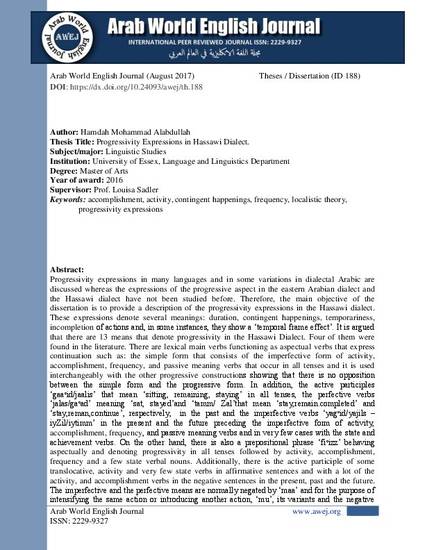
Thesis
Progressivity Expressions in Hassawi Dialect.
(2017)
Abstract
Progressivity expressions in many languages and in some variations in dialectal Arabic are discussed whereas the expressions of the progressive aspect in the eastern Arabian dialect and the Hassawi dialect have not been studied before. Therefore, the main objective of the dissertation is to provide a description of the progressivity expressions in the Hassawi dialect. These expressions denote several meanings: duration, contingent happenings, temporariness, incompletion of actions and, in some instances, they show a ‘temporal frame effect’. It is argued that there are 13 means that denote progressivity in the Hassawi Dialect. Four of them were found in the literature. There are lexical main verbs functioning as aspectual verbs that express continuation such as: the simple form that consists of the imperfective form of activity, accomplishment, frequency, and passive meaning verbs that occur in all tenses and it is used interchangeably with the other progressive constructions showing that there is no opposition between the simple form and the progressive form. In addition, the active participles ‘gaaᶜid/jaalis’ that mean ‘sitting, remaining, staying’ in all tenses, the perfective verbs ‘jalas/gaᶜad’ meaning ‘sat, stayed’and ‘tamm/ Zal’that mean ‘stay,remain.completed’ and ‘stay,reman,continue’, respectively, in the past and the imperfective verbs ‘yagᶜid/yajils –iyZil/iytimm’ in the present and the future preceding the imperfective form of activity, accomplishment, frequency, and passive meaning verbs and in very few cases with the state and achievement verbs. On the other hand, there is also a prepositional phrase ‘fiᶜizz’ behaving aspectually and denoting progressivity in all tenses followed by activity, accomplishment, frequency and a few state verbal nouns. Additionally, there is the active participle of some translocative, activity and very few state verbs in affirmative sentences and with a lot of the activity, and accomplishment verbs in the negative sentences in the present, past and the future. The imperfective and the perfective means are normally negated by ‘maa’ and for the purpose of intensifying the same action or introducing another action, ‘mu’, its variants and the negative copula are used instead. The perfective ‘Zal/tamm’ is either preceded by the negation particle denoting a progressive reading or followed by the negation particle indicating two readings; habitual or progressive. The active participles and the prepositional phrase denoting progressivity are negated by the particle ‘mu’normally in the present tense and by ‘maa’ in the past and the future tenses. Finally, the progressive construction in Hassawi dialect shows clear evidence that support Anderson’s localistic theory which indicates that the notion of location and direction is involved in the different aspect expressions in many languages. In one construction, a locative participle is used and in the other one, a locative prepositional phrase is used.
Keywords
- accomplishment,
- activity,
- contingent happenings,
- frequency,
- localistic theory,
- progressivity expressions
Disciplines
Publication Date
Summer August 15, 2017
Degree
MA
Field of study
Linguistic Studies
Department
University of Essex, Language and Linguistics Department
Advisor
Prof. Louisa Sadler
DOI
https://dx.doi.org/10.24093/awej/th.188
Citation Information
Hamdah Mohammad Alabdullah AWEJ. "Progressivity Expressions in Hassawi Dialect." (2017) Available at: http://works.bepress.com/arabworldenglishjournal-awej/374/